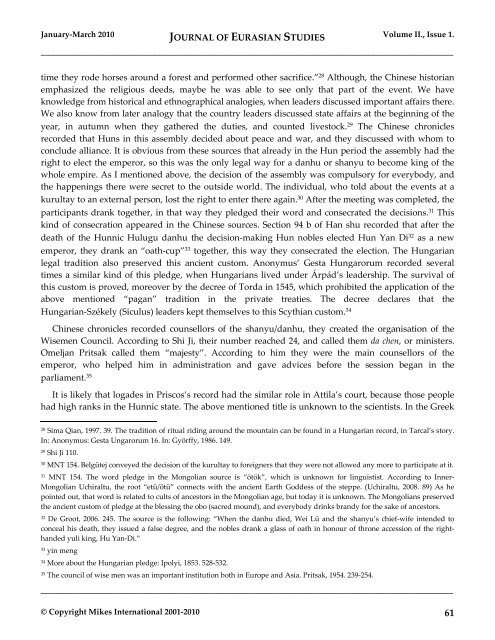EurasianStudies_0110..
EurasianStudies_0110..
EurasianStudies_0110..
Create successful ePaper yourself
Turn your PDF publications into a flip-book with our unique Google optimized e-Paper software.
January-March 2010 JOURNAL OF EURASIAN STUDIES Volume II., Issue 1.<br />
_____________________________________________________________________________________<br />
time they rode horses around a forest and performed other sacrifice.” 28 Although, the Chinese historian<br />
emphasized the religious deeds, maybe he was able to see only that part of the event. We have<br />
knowledge from historical and ethnographical analogies, when leaders discussed important affairs there.<br />
We also know from later analogy that the country leaders discussed state affairs at the beginning of the<br />
year, in autumn when they gathered the duties, and counted livestock. 29 The Chinese chronicles<br />
recorded that Huns in this assembly decided about peace and war, and they discussed with whom to<br />
conclude alliance. It is obvious from these sources that already in the Hun period the assembly had the<br />
right to elect the emperor, so this was the only legal way for a danhu or shanyu to become king of the<br />
whole empire. As I mentioned above, the decision of the assembly was compulsory for everybody, and<br />
the happenings there were secret to the outside world. The individual, who told about the events at a<br />
kurultay to an external person, lost the right to enter there again. 30 After the meeting was completed, the<br />
participants drank together, in that way they pledged their word and consecrated the decisions. 31 This<br />
kind of consecration appeared in the Chinese sources. Section 94 b of Han shu recorded that after the<br />
death of the Hunnic Hulugu danhu the decision-making Hun nobles elected Hun Yan Di 32 as a new<br />
emperor, they drank an “oath-cup” 33 together, this way they consecrated the election. The Hungarian<br />
legal tradition also preserved this ancient custom. Anonymus’ Gesta Hungarorum recorded several<br />
times a similar kind of this pledge, when Hungarians lived under Árpád’s leadership. The survival of<br />
this custom is proved, moreover by the decree of Torda in 1545, which prohibited the application of the<br />
above mentioned “pagan” tradition in the private treaties. The decree declares that the<br />
Hungarian-Székely (Siculus) leaders kept themselves to this Scythian custom. 34<br />
Chinese chronicles recorded counsellors of the shanyu/danhu, they created the organisation of the<br />
Wisemen Council. According to Shi Ji, their number reached 24, and called them da chen, or ministers.<br />
Omeljan Pritsak called them “majesty”. According to him they were the main counsellors of the<br />
emperor, who helped him in administration and gave advices before the session began in the<br />
parliament. 35<br />
It is likely that logades in Priscos’s record had the similar role in Attila’s court, because those people<br />
had high ranks in the Hunnic state. The above mentioned title is unknown to the scientists. In the Greek<br />
28 Sima Qian, 1997. 39. The tradition of ritual riding around the mountain can be found in a Hungarian record, in Tarcal’s story.<br />
In: Anonymus: Gesta Ungarorum 16. In: Györffy, 1986. 149.<br />
29 Shi Ji 110.<br />
30 MNT 154. Belgütej conveyed the decision of the kurultay to foreigners that they were not allowed any more to participate at it.<br />
31 MNT 154. The word pledge in the Mongolian source is “ötök”, which is unknown for linguistist. According to Inner-<br />
Mongolian Uchiraltu, the root “etü/ötü” connects with the ancient Earth Goddess of the steppe. (Uchiraltu, 2008. 89) As he<br />
pointed out, that word is related to cults of ancestors in the Mongolian age, but today it is unknown. The Mongolians preserved<br />
the ancient custom of pledge at the blessing the obo (sacred mound), and everybody drinks brandy for the sake of ancestors.<br />
32 De Groot, 2006. 245. The source is the following: “When the danhu died, Wei Lü and the shanyu’s chief-wife intended to<br />
conceal his death, they issued a false degree, and the nobles drank a glass of oath in honour of throne accession of the righthanded<br />
yuli king, Hu Yan-Di.”<br />
33 yin meng<br />
34 More about the Hungarian pledge: Ipolyi, 1853. 528-532.<br />
35 The council of wise men was an important institution both in Europe and Asia. Pritsak, 1954. 239-254.<br />
_____________________________________________________________________________________<br />
© Copyright Mikes International 2001-2010 61

















